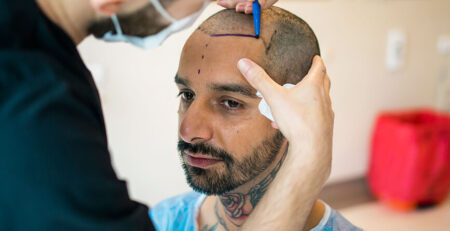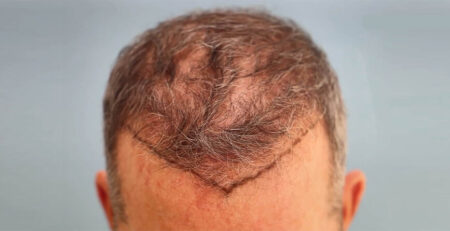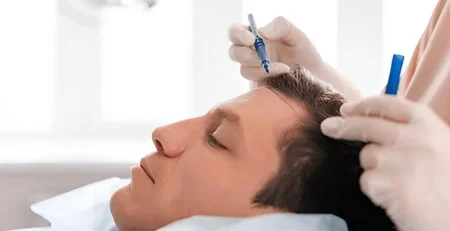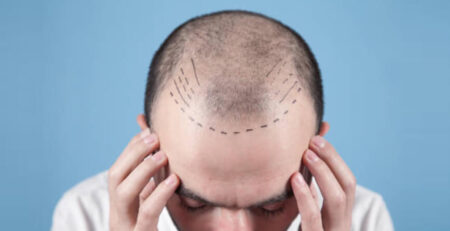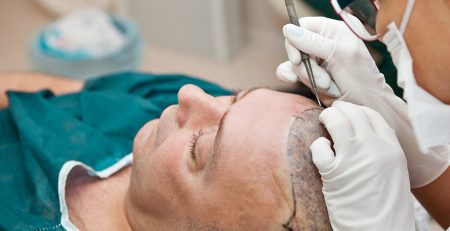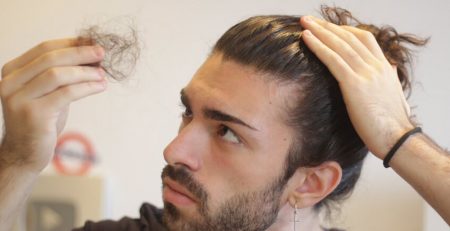Know Everything About Hair Transplant for Men
Hair transplant has emerged as one of the most innovative hair restoration procedures in cosmetic surgery. It has reduced the stress for many that came from severe hair loss. An increasing number of hair loss patients are today resorting to hair transplants in Delhi, especially men, as the results produced by the treatment are impressive and permanent. Though the demand for the procedure is increasing, complete knowledge about it is still not available to many.
Through this blog, we will understand the procedure and its benefits in detail.
Let’s begin.
A hair transplant is a minimally invasive surgical procedure that helps move hair follicles from a particular hairy site on your head or body to the bald location on your scalp. The spot where the hair is harvested is the ‘donor site’, and the area where it is planted is the ‘recipient site’.
Today, hair transplantation is an effective and proven treatment modality for hair loss. This restoration technique is mainly targeted for male baldness treatment, as the men suffer greatly with receding hairlines or male pattern baldness. Fortunately, a transplant is a safe approach to permanently getting rid of baldness because it uses the patient’s own hair follicles for the treatment.
Who is an ideal candidate for a hair transplant?
Anyone with severe hair loss or baldness is a good candidate for a hair transplant.
However, the individuals planning for the procedure must ensure:
- They have healthy hair on the scalp or body to be extracted.
- Their overall scalp health is good to help the new hair grow naturally.
- They are not having major medical disorders that may trigger further hair loss.
How does hair loss or balding happen?
The hair loss phenomenon in men can be explained simply by Dihydrotestosterone (DHT), an androgen-male hormone that precipitates hair loss. At a certain age, the presence of this hormone in the body is escalated, causing the hair follicles to shrink. It also shortens the hair cycle resulting in thinner and brittle hair. Thus, DHT is the primary reason behind male pattern baldness. Before the hair transplant in Delhi, your surgeon will ensure the donor site is not affected. He will also evaluate your general health during the consultation to ensure your eligibility for a transplant.
Types of Hair Transplant
Currently, two prominent hair transplant techniques are follicular unit extraction (FUE) and follicular unit transplantation (FUT). They differ in the procedure by how the hair follicles are extracted from the donor site. The choice of procedure depends on your health, the possibilities, namely the type of baldness, site of hair fall etc. and your surgeon’s expertise on a certain procedure.
Let us take a look at both the procedures in demand.
Follicular Unit Transplantation (FUT): In this procedure, the surgeon extracts a strip of skin from your hairy area in the back of scalp. The strip is dissected into single single garfts. They are implanted into the bald site. These grafts re-initiate hair growth in the balding area.
Follicular Unit Extraction (FUE): The hair follicles are extracted directly from the hairy side of the head using tiny punch incisions. The surgeon creates minute holes at the implant site. The extracted follicles are then implanted in these holes. Hundreds of hair follicles implanted in a single session. Once done, your wound is dressed with bandages.
What does the hair transplant in Delhi include?
Hair transplant is a daycare procedure, which means you can return home the same day within a few hours of the procedure. It is done under local anaesthesia. Hair follicles from the donor site are extracted and implanted to the hairless area. These healthy hair follicles are usually extracted from the site resistant to hair fall, ensuring your new hair grows without further hair loss.
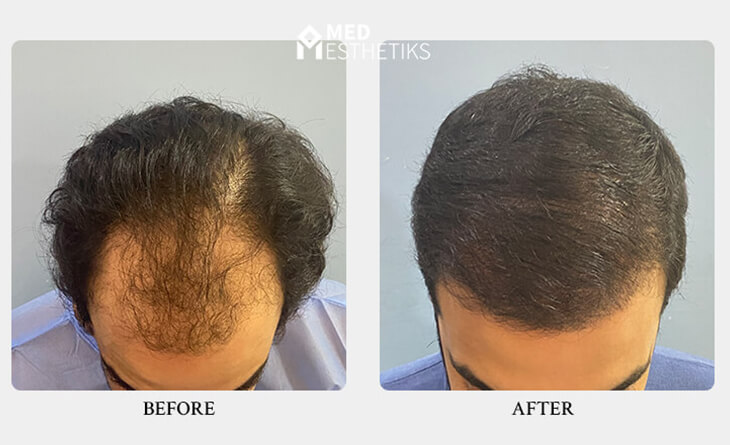
Recovery After Hair Transplant
Recovery from the treatment is not at all difficult if you follow your surgeon’s guidelines completely.
After the surgery, you may feel sore for just a few days, and your scalp may be swollen and painful. The swelling, discomfort, and pain regresses completely during the initial recovery phase. The doctor will prescribe you antibiotics and analgesics to provide comfort and speed up the healing.
Most patients are fit to resume their daily routine within a few days after the surgery.
One must remember it is natural for the implanted hair to shed two to four weeks post the procedure. This is a regular aspect of the procedure. The old hair attached to the follicles falls, making way for the new hair to grow at its new site.
How long does it take for complete hair to grow after a hair transplant?
Some of you may be unaware that a hair transplant does not yield immediate results. You cannot expect to walk out of the operating room with dense hair growth. Post-surgery, there may be an initial phase of dormancy which lasts for 3 months. During this phase, you may notice the fall and thinning of the transplanted hair, which is normal. This is followed by the active new hair growth, which becomes evident from the 4th – 7th month onwards. Some patients experience early growth, which varies according to several factors like site of transplant, patient’s age and tissue response.
Most patients attain a dense growth between the 7th to 10th month after the hair transplant in Delhi. After a year, the hair transplant donor site is not even visible as it remains hidden under the dense hair on your scalp.
A skilled, qualified and experienced hair transplant surgeon will always guide you through every aspect of the surgery to help you with realistic expectations.
Is hair transplant a successful treatment?
Yes, a hair transplant in Delhi is a successful when performed by a board-certified, expert surgeon. Their credentials, expertise and surgical exposure determine the success of your treatment. When opting for surgical procedures, it is always the best to approach the surgeons with positive patient reviews.
One must make a wise decision and choose a hair transplant surgeon adept in hair restoration techniques. Experience matters largely as all surgeons may not be hair transplant specialists. Your surgeon’s calibre to graft hair accounts for the success of the treatment. Additionally, marking a precise hairline for implants needs a unique surgical skill. Therefore, choose a hair transplant surgeon who is well experienced and expert in every nuance of the procedure.
Moreover, the infrastructure and technology at the operating facility also matters. A hair transplant clinic must be equipped with the most modern, innovative and latest technological tools to aid a successful surgery producing desired and safe results.
Are you planning for a hair transplant?
If yes, walk into Med Esthetiks at Delhi. Dr Lokesh Handa, the principal consultant at the facility, is an expert board-certified hair transplant surgeon. With numerous successful transplant procedures under his belt, Dr Handa has carved a niche for himself in the realm of corrective cosmetic procedures. His medical profess, and the availability of innovative techniques with world-class infrastructure at Med Esthetiks come together to ensure the best cure and care for the patients, producing exceptional results.


